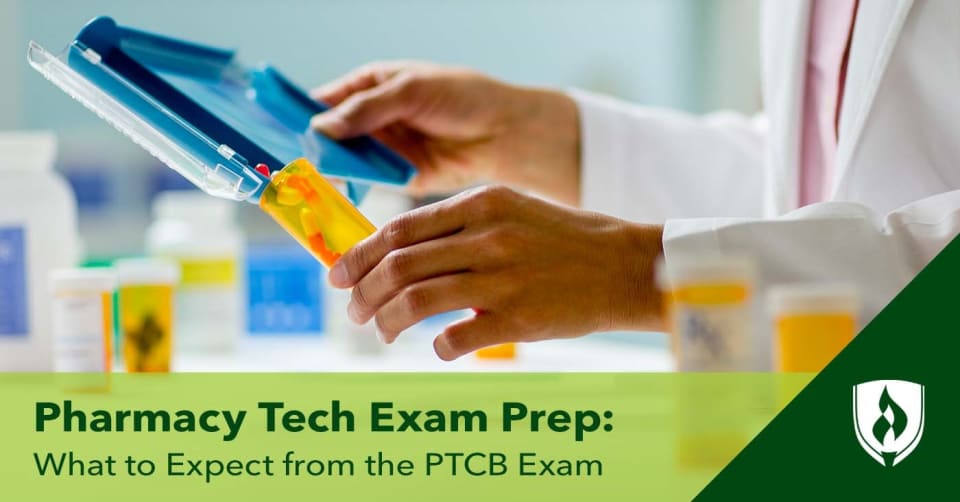
Every time you pick up a prescription at a drugstore, you might wonder about the career behind the counter. You like the look of the job. Pharmacy technicians work in clean, bright environments, in the heart of a growing and secure industry—and they help connect people with the prescriptions they need for happier, healthier lives.
The counter that separates this role from pharmacy customers is often just a bit of Formica®. But think of it as a symbol of all the training that pharmacy technicians take on to become certified pharmacy technicians (CPhTs).
To earn this credential, you’ll first need to pass the Pharmacy Technician Certification Board’s (PTCB)® Pharmacy Technician Certification Exam (PTCE)®. If you could use a little extra insight into what this exam is like and how you can prepare for it, read on!
Is the Pharmacy Technician Certification Exam (PTCE) required?
The answer to this question is most likely yes. While there are variances from state to state, most states require pharm techs to hold national certification or licensure as of 2020, according to the PTCB.1 Check out their map for a quick overview of the pharmacy technician requirements in your state. It should be noted that while this article focuses specifically on the PTCB’s exam, there’s also a national certification exam offered by the National Healthcareer Association® that, while obviously not the same test, covers many of the same subjects and is also widely recognized.
Even if your state does not require pharmacy techs to be certified, earning this credential may still be a good idea. According to a PTCB survey, the public wants pharmacy technicians to be certified, with 85 percent of those survey participants rated certification as “very important.”2 Certification helps the public trust the professionals who handle their medications, prescriptions and vaccinations, and employers certainly like to see it as well.
Another factor worth considering is that while many pharmacy technicians will work in traditional clinics and commercial pharmacy settings, there are specialized roles within managed care, nuclear pharmacy, veterinary pharmacy and compounding pharmacies where being certified can be a big advantage.
What to expect when taking the PTCB exam
The format of the PTCB exam consists of 90 multiple-choice questions. But there’s a small catch to keep in mind—only 80 of the multiple-choice questions are scored, while 10 are not. Of course, as the test taker, you won’t know which ones count and which ones don’t, as they’re spread randomly throughout the test. Test takers have one hour and 50 minutes to complete the exam, so with 90 questions to answer, that gives you a minute and 22 seconds per question on average.
To be on top of your game, you need to know your material. So what can you expect from the exam? Let’s take a look.
Topics covered in the PTCB exam
The PTCB exam tests applicants in four categories, which are referred to as “knowledge domains” by the board. Within each of the knowledge domains are more specific subdomains. Test takers can expect to cover questions related to these topics:
- Pharmacology for technicians
- Pharmacy law and regulations
- Sterile and non-sterile compounding
- Medication safety
- Pharmacy quality assurance
- Medication order entry and fill process
- Pharmacy inventory management
- Pharmacy billing and reimbursement
- Pharmacy information system usage and application
For more detailed information about topics that are covered in the exam, prospective test takers should look at the PTCE content outline.
PTCB exam prep resources
If you’re going to take the PTCE, it will help to get in some serious study time. Fortunately, there are several good resources for students, both from the Pharmacy Technician Certification Board and external sources. Here are some options to consider:
1. Official PTCB Practice Exam
Practice makes perfect—and what better practice exam is out there than the one created by the PTCB itself? The Pharmacy Technician Certification Board offers a practice exam that mirrors the actual exam in both content and format. So when you sit down for the real exam, you’ll be better prepared for the type of questioning and exam format. Just like the official exam, the practice version contains 90 questions, allowing you to pace yourself against the clock at home.
2. Official PTCB Calculations Practice App
Have some spare time while riding the bus or relaxing at home? Simply take out your phone and try out the Official PTCB Calculations Practice Questions App—available for both Apple and Google Play®. The app gives users the opportunity to practice typical calculation questions found on the exam. These questions are actually pulled from earlier versions of the exam, giving students a very realistic look at what they will encounter during the real thing. Like the actual exam, the app includes 90 questions. The app also contains detailed explanations of how the correct answer was determined.
3. Pharmacy technician training
There are more guided ways to prepare for and take the exam as well. Some prefer to enroll in a program that teaches the essential PTCB exam material and assists with pharm tech certification. Rasmussen University, for instance, offers a Pharmacy Technician Certificate program that prepares students to take the Pharmacy Technician Certification Exam. The coursework focuses on essential skills along with real-life scenarios for pharmacy technicians. This program can be completed in as few as 9 months and includes reimbursement for PTCE application fees.3, 4
4. Library-based resources
Check your local library for books related to the PTCB exam. If you are part of a Pharmacy Technician program at Rasmussen University, you can make use of free library resources as well. The Library and Learning Services team offers these pharmacy technician exam prep resources.
PTCB exam advice
To prepare for the PTCE, Jared Leonard, a former pharmacy technician turned pharmacist, recommends practice tests that resemble the actual test. Additionally, Leonard says there are a couple of focus areas that test takers may struggle with.
“I think the most challenging part of the exam, and where I’d recommend students spend most of their time preparing, is with the calculations,” Leonard said. “It’s the highest-rated part of the exam. You need to calculate things like going from grams to milliliters and fluid ounces to milliliters. You’ll do a lot of calculations from the royal to metric systems of measurement.”
Leonard also recommends spending some time studying pharmacy law—know the major laws and regulations guiding pharmacy workers and what they do.
In addition to getting plenty of advance practice and review time in, there are steps you can take to keep test day anxiety in check. Little things like getting familiar with the test site, guided meditations and more can help you stay centered and focused solely on the task at hand.
Be prepared to succeed
There’s no denying the healthcare field is an attractive place to start a career. Becoming a pharmacy technician and earning certification is one of many excellent lower barrier entryways to get started in healthcare.
While you could always try your hand at preparing for the PTCB exam on your own, you may want to consider a structured educational program designed to help you master the concepts and materials needed to pass. The Rasmussen University Pharmacy Technician Certificate program could be the perfect starting point for your healthcare career education.
1“State Regulations Map” Pharmacy Technician Certification Board, December 31, 2020. [Accessed January 2022] https://www.ptcb.org/resources/state-regulations-and-map
2“Survey Shows Three-Quarters of Americans Would Seek Out a Pharmacy Where Pharmacy Technicians are Certified.”Pharmacy Technician Certification Board, October 13, 2016. [Accessed January 2022] https://www.ptcb.org/news/survey-shows-three-quarters-of-americans-would-seek-out-a-pharmacy-where-pharmacy-technicians-are-certified
3Completion time is dependent on the number of transfer credits accepted and the number of courses completed each term.
4Rasmussen University will reimburse the application fee for each qualified student’s first attempt of one of the following industry certification exams: Pharmacy Technician Certification Examination® (PTCE®) or Exam for the Certification of Pharmacy Technicians (ExCPT). Should you need to take an exam more than once to receive a passing grade score, you will be responsible for all subsequent exam application fees.
Pharmacy Technician Certification Board (PTCB) and Pharmacy Technician Certification Exam (PTCE) are registered trademarks of National Healthcareer Association.
Formica is a registered trademark of The Diller Corporation.




